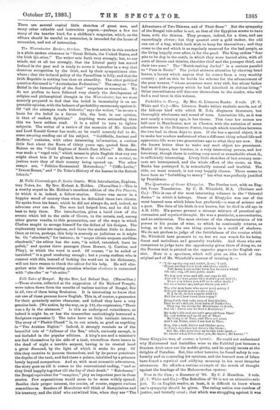The Westminster Review, October. The first article in this number
is a plain-spoken utterance in "Great Britain, the United States, and - the Irish Question." The writer sets forth very strongly, but, to our minds, not at all too strongly, that the Liberal party has served Ireland in the past and is ready to serve it hereafter in a way that deserves recognition by the Irish, and by their sympathisers else- where ; that the isolated policy of the Parnellites is folly, and that the Irish Republic is nothing less than an absurdity. The other political question discussed is "Australasian Federation." The essay on "The Belief in the Immortality of the Soul" surprises us somewhat. We do not profess to have followed very closely the development of religion and philosophical thought in the Westminster, but we were scarcely prepared to find that the belief in immortality is an un- provable opinion, with the balance of probability enormously against it. Of "all the attempts made hitherto," says the writer, "to secure a basis for the belief in a future life, the best, in our opinion, is that of modern Spiritists." Anything more astounding than this we have seldom read. It is a relief to turn to lighter subjects. The writer of a review of the memoirs of Mr. Greville and Lord Ronald Gower has made, as he could scarcely fail to do, some amusing reading out of his subject. "Goldfields, Ancient and Modern," contains, with other interesting information, a curious little fact about the Boers of thirty years ago, quoted from Mr. Baines on the "Gold Regions of South-East Africa." Mr. Baines was made a " vogel vrie," which means in plain English that any one might shoot him if he pleased, because he could use a sextant, so jealous were they of their country being opened up. The other essays are, "Politico-Economical Heterodoxy," " Cliffe-Leslie," "Ernest Reuss," and " Dr. Take's History of the Insane in the British Islands."


































 Previous page
Previous page